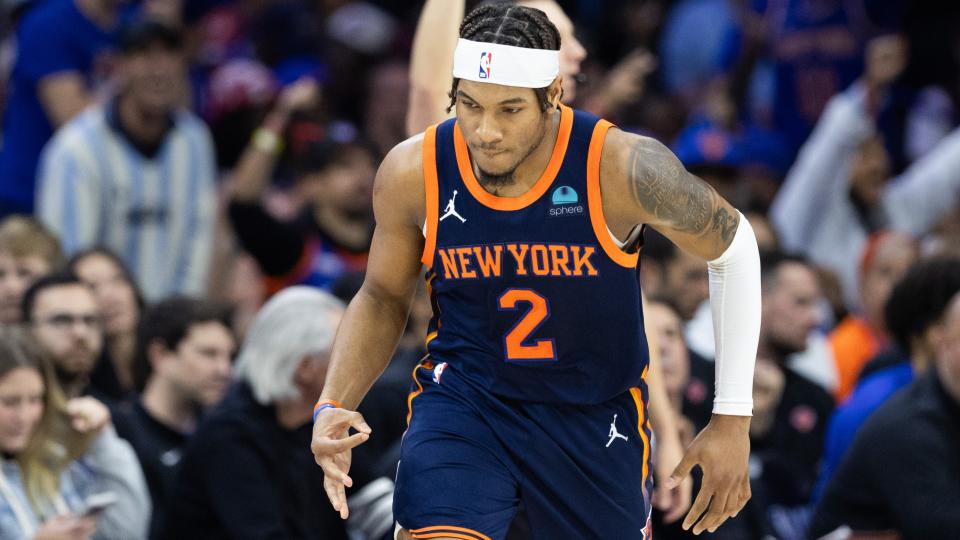The Knicks shocked the NBA world for the second time this offseason last Friday night, trading Julius Randle and Donte DiVincenzo to the Timberwolves for Karl-Anthony Towns. New York secured a star player at an especially-weak position, in hopes that the deal would propel them into contention, but had to sacrifice some major pieces in the process.
While some consider Towns and Randle to be close to a wash in talent, in large part flipped for contractual reasons, New York’s inclusion of DiVincenzo appeared to seal the deal. His departure means the loss of a full-time starter, one of the best shooters in the league with a 40.1 three-point percentage on 8.7 attempts a night, and their second-leading scorer in the 2024 playoffs at 17.8 points per game.
There are multiple reasons behind the Knicks’ willingness to move that much talent and an entire additional rotation member despite already facing depth issues. They likely believe that the flexibility and shooting provided by Towns outweighs what they gave up, and DiVincenzo was on his way to a minutes cut after a career year, which isn’t the best for morale.
But perhaps one overlooked reason for New York’s comfort in losing DiVincenzo in pursuit of this trade is its confidence in the player stepping up in his absence: Miles McBride.
After two uninspiring seasons bouncing between Westchester and the end of the Knicks bench, McBride was thrust into regular minutes following the OG Anunoby trade last December. New York immediately inked him to an extension, and he proceeded to put together the best stretch of his pro career, finally converting from three and looking for his offense with the same aggressiveness he brought to defense.
After the trade, McBride averaged 10.6 points on 41 percent shooting from three, averaging 24.9 minutes a night over 50 games. He was instrumental in filling in for rotation players dealt or injured, thanks to his ability to spread the floor and lock up opposing guards.
Tom Thibodeau’s trust in McBride grew to a point where he was inserted into the starting lineup late in the regular season after yet another blow to the rotation. He responded with a 29-point outburst in a shorthanded win over the Golden State Warriors and Steph Curry, whom McBride held to 4-of-13 shooting from three.
McBride averaged a whopping 44.5 minutes in those nine consecutive games he started, putting up 18.9 points on 44.3 percent shooting from three. He rose from bench fodder to invaluable contributor in a matter of months, and this momentum carried into the playoffs.

McBride kicked off his postseason career with a 21-point, 5-of-7 three-point shooting night against the 76ers, and helped put them away with a 13-point Game 4. He finished the postseason averaging 11 points on 36.8 percent shooting from three with his usual brand of stifling defense.
Given the velocity and substance of McBride’s ascent, it starts to make sense why the Knicks felt they could move past a DiVincenzo departure. At times last year, McBride was playing the DiVincenzo three-and-D shooting guard role even better, closing games in the regular and postseason in place of DiVincenzo.
He’s already the better defender, and has shown the ability to convert 40 percent from three on high volume. Like DiVincenzo, he can hit them off movement — even off the dribble as well.
McBride is almost four years younger, and will see his minutes increase or at least plateau while DiVincenzo would have had to adjust to seeing the court less. The latter may be the more gifted creator on the ball, but perhaps not for long.
New York is betting on another big leap from McBride, and after betting on him with the post-trade extension, the late-season starting role, and the 2024 playoff minutes, it doesn’t look like a bad bet. This development needs to be in his off-the-dribble game, passing and scoring from inside the arc — areas where we’ve seen good and bad flashes from.
McBride has decent handles and the ability to get off a surprising ankle-breaker or create space on a stepback, but can look uncomfortable under pressure as your traditional point guard bringing the ball up and initiating the offense. With Jalen Brunson taking the majority of those reps, DiVincenzo gone, and a couple of fringe guards fighting for McBride’s minutes, Deuce will need to sharpen this portion of his game up.
On the pick-and-roll, McBride improved as the season went on in leveraging his bursts of speed and strength to create angles and find opportunities for himself and others. He can finish with his off-hand, slam through posters given enough runway, and has a solid foundation for his floater and midrange pull-up.
Putting these together with a more refined handle and attacking mentality as the lead bench guard will be instrumental in covering up the loss of DiVincenzo, and keeping the Knicks reserves at pace with their starters. McBride could also very well start for this squad, if they value his shooting in place of Josh Hart’s energy in Towns-at-the-five lineups.
Losing guys who created all-time franchise moments and memories is never easy, especially when they’re so crucial to a team’s recurring success. But this front office has consistently crafted its latest Knicks iteration to be better than the last. And in making this trade, it plans to do the same — even if that relies as much on the players already here than the ones coming in.
